 |
|
 |
 |
 |
- 10/21/08: Remarks by Henrietta Fore, Administrator, USAID and Director of U.S. Foreign Assistance at the White House Development Summit
- 10/08/08: Remarks by Henrietta Fore, USAID Administrator and Director of U.S. Foreign Assistance at The President's Freedom Agenda
- 10/01/08: Remarks by Henrietta H. Fore, Administrator, USAID and Director of U.S. Foreign Assistance, at the Ceremony Marking the Full Operational Capacity of Africa Command (AFRICOM)
- 09/25/08: Remarks by Henrietta H. Fore, Administrator, USAID and Director of U.S. Foreign Assistance, at 2008 Millennium Development Goal Malaria Summit, New York - "U.S. Leadership in the Fight Against Malaria"
- 09/22/08: Remarks by Henrietta H. Fore, Administrator, USAID and Director of U.S. Foreign Assistance, at the White House Symposium on Advancing Global Literacy - "U.S. Commitment to Advancing Global Literacy"
 RSS Feed for Recent USAID Speeches and Testimony RSS Feed for Recent USAID Speeches and Testimony
|
|
 |
 |
|
 |
 |
|
Remarks by Dr. Kent R. Hill
Assistant Administrator, Bureau for Global Health
Safe Water
Safe Drinking Water Event
Rotunda, Ronald Reagan Building
March 6, 2007
Thank you for your kind introduction, Barbara. She is a key advocate and friend of global health issues for USAID. I also want to thank Dan Runde, Ms. Lily Sambu with the Embassy of the Republic of Kenya and Charlotte Otto from The Procter && Gamble Company. And thank you all for coming tonight. It is my great honor to join you to celebrate an important partnership to provide safe drinking water at the household level to millions of children in Africa
It is easy in Washington, D.C. to take for granted the availability and accessibility of safe water. But in many places, safe drinking water is a most precious and hard to find entity. More than a billion people in developing do not have access to cleam water. The consequences are catastrophic.
About 1.6 million children under age 5 died last year from diarrheal diseases caused by unsafe water and sanitation in developing countries, and millions more were put at significant risk of exposure to water-borne infections, such as cholera, typhoid fever, and dysentery. Contaminated drinking water is also a threat to people living with HIV/AIDS.
USAID and Procter && Gamble share a common vision to provide options to those without access to safe water, options often unavailable to the poorest and most vulnerable.
The good news is that low-cost solutions are available to dramatically improve the quality of existing household water used for drinking and cooking. Procter and Gamble's PUR sachets and dilute chlorine bleach can provide safe water during emergencies and natural disasters, including recent earthquakes, floods and hurricanes. These inexpensive and easy to use solutions to the problem of contaminated water can be made available to vulnerable populations quickly, and can reduce diarrheal diseases by 30-50 percent.
Improving access to safe water is an important component of USAID health and emergency response programs. Household water treatment and safe storage reduces waterborne disease, empowers families and communities, and improves productivity. These measures compliment community and municipal water supply infrastructure programs by providing immediate access to safe water while construction is planned or implemented.
We are working with a broad range of groups to promote P&G's PUR sachets and other chlorine-based disinfectants along with promoting hygiene behavior change to improve health. I want to recognize and thank the World Health Organization, UNICEF, Centers for Disease Control and Prevention, PSI, CARE, the Johns Hopkins University Center for Communication Programs, Rotary, and others for their partnership. Our collaboration to save lives inspires us to do more.
There are many innovative examples of how USAID works to increase access to safe water and improve water quality in households.
USAID is an active member of the International Network to Promote Household Water Treatment and Safe Storage, which works on advocacy, research, and implementation of safe water projects. USAID and P&&G have sought the assistance of PSI to socially market liquid chlorine and PUR, offering consumers options for treatment, customized for each community. Currently PSI has social marketing programs for PUR in 8 countries, and WaterGuard, a liquid bleach solution, in 18 countries. In addition to distributing through commercial channels, PSI works with health clinics, schools, clubs, and NGOs to expand the reach of their products and messages directly to the vulnerable populations and to mobilize communities for long-term sustained change.
In Kenya, non-governmental and faith-based organizations, as well as a group of women living with HIV/AIDS, distribute safe water products and provide demonstrations on how to use these products for communities. These people play a powerful role in shaping the opinions, attitudes and behaviors of their communities.
USAID also worked recently with other members of the International Network and representatives of the Kenya Government to develop a policy and concrete action plan for including household water treatment in the government's strategic plan for preventive health.
In the Democratic Republic of the Congo, we supported access to point of use water treatment by having customs duties removed from imported safe water kits.
Addressing poverty is a key priority of the United States Government's foreign assistance strategy. At USAID, we believe that improved health for the world's poorest people is not only a moral imperative but also as a pragmatic investment in promoting global peace, security, and world-wide economic growth.
To improve the health of billions of people, particularly the poor in developing countries, we must join together to provide safe water, fight global disease pandemics like AIDS and malaria, improve democracy and good governance, reduce illiteracy, and provide the basis for economic growth.
I am committed to strengthening relationships with the private sector and non-governmental organizations so we can sustain the impact of our efforts. Our partnership is key to promoting growth, good health and stability around the world.
I look forward to our continued work to improve health.
Thank you.
Back to Top ^
|


